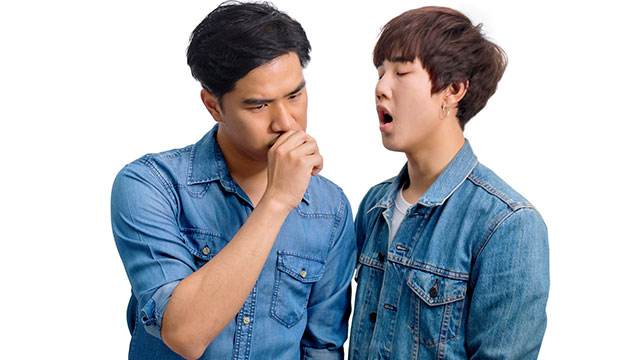First up, if you think you might have bad breath, don’t worry—there are plenty of ways to help prevent and treat it. Often, the best way to avoid halitosis is to keep up a good dental hygiene routine. Although sometimes, bad breath has other causes, like diet or health conditions, so don’t be too hard on yourself.
Ask someone you trust
It may feel awkward to ask someone to look inside your mouth or smell your breath and give you feedback. Just make sure it’s an appropriate person to ask, like a partner, family member or close friend. Ask them to smell your breath and take a peek inside your mouth to see if they notice a white coating on your tongue. This is a common sign of bacteria that causes bad breath.
If you’re too embarrassed to ask someone close to you, you can always look in the mirror or better still, ask your dental professional. A dental professional can assess the air from your mouth and nose to help find the source of an odour. Whatever the outcome, a dental professional will be able to help you treat or prevent bad breath from happening in the future.
Give your breath the sniff test
Need to check how your breath smells quickly? Try the sniff test—there are a couple of ways to do this. If you lick your wrist, let it dry for a moment, then take a whiff; you should get an idea if your breath has an odour. Another method is to floss toward the back of your mouth, then smell the floss. Alternatively, gently scrape your tongue using a tongue scraper or soft bristle toothbrush, then smell the scraper. Have fun!
How to smell your breath
There is a way you can taste your breath, which will give you the same information as smelling it. If you’ve eaten something with a potent odour, such as garlic or fish, and you can still taste it, chances are others can smell it on your breath too. Similarly, if you have a condition such as a dry mouth or if you’re dehydrated, you may be able to taste your breath. Signs of dry mouth include thick, foamy saliva and a change in taste. A good rule of thumb is that if you have a bad taste in your mouth, it’s very likely the way your breath smells, too.
To help alleviate mouth odour, rinse your mouth with water. Rinsing washes away food debris and stimulates the cleansing flow of saliva. Additionally, make sure you perform your usual dental hygiene routine after every meal.
What to do about bad breath
If you’re concerned about your breath, the best thing to do is stay on top of your oral hygiene routine. This includes brushing twice a day and flossing or cleaning between your teeth at least once a day. Sometimes, your brushing and flossing routine doesn’t do enough to remove the bacteria affecting your breath. So if you feel you need a little extra ammunition, rinse with mouthwash or use a water flosser to get rid of any lingering, odorous bacteria.
If you think your breath smells unpleasant because of your diet, it can help to keep a food journal. Another option is to temporarily cut out certain foods from your diet (providing this doesn’t interfere with your nutritional intake) to see if your breath improves. But if you have persistent bad breath that you can’t shake, talk to your doctor or dentist. A medical condition, such as a digestive problem, can cause bad breath, so mention this to a medical professional as soon as possible.
This article is intended to promote understanding of and knowledge about general oral health topics. It is not intended to be a substitute for professional advice, diagnosis or treatment. Always seek the advice of your dentist or other qualified healthcare provider with any questions you may have regarding a medical condition or treatment.














